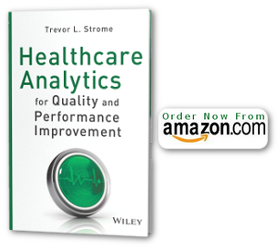The need for convenient access to information is growing.
The use of data within Healthcare Organizations (HCOs) is growing at an astronomical rate. Efforts to guide decision-making and quality improvement initiatives with the best evidence possible mandate convenient access to up-to-date and accurate healthcare performance data. For example, Dashboards ranging from advanced “flight-board” schedule rosters to real-time Emergency Department wait time displays are now nearly ubiquitous throughout HCOs. Management and researchers alike are adopting advanced resource planning approaches that use simulation and predictive modeling to determine which patients will likely be requiring care, how long they’ll stay once they arrive at the HCO, and what resources they’ll need to expedite their discharge.
The analyst as “gatekeeper” actually hinders access to information.
Due to the specialist knowledge and skills of healthcare business intelligence professionals (which often include both technical and domain expertise), they are often in a position to be the “gatekeepers” of the data. Because most managers and others within an HCO who need information are often too busy (or disinclined) to obtain it by themselves, however, analysts become the de-facto “go-to” people for healthcare operations data.
This “gatekeeper” function analytics professionals often find themselves in, however, actually is counterproductive for both the organization as a whole and the analyst as an individual. Experience at top-performing organizations demonstrate that it is most efficient when executives, managers, and others who need information for decision-making and planning are able to access it for themselves. This “self-serve” access best occurs through well-developed analytics portals and report repositories that are easy to access, use, and navigate.
Healthcare leaders and administrators who need direct access to information are most likely looking for a quick answer to an operational question (such as, “how many Emergency Department visits did we have this weekend”). With the ever-increasing number of data requests, it is easy for analyst “gatekeepers” to become overwhelmed with daily requests for “routine” operational data, if preparing these manually. It is these requests that are better left to “self-serve” systems.
When being “busy” is not being “productive”.
Not only does going through an analyst for routine information delay getting information into the hands of the people who need it, there is very little intrinsic value (in terms of professional development) or challenge for the analyst in handling such requests. When the routine operational data requests are handled through a self-serve analytics portal, the analytics professional will be freed for more true analytics work, including more time for innovation, research, and collaboration activities. For example, more time will be freed up to improve existing analytics tools, develop new predictive models, and be more responsive to requests for information that actually require the skills of an analytics professional.
Healthcare organizations should implement self-serve business intelligence and analytics portals that allow routine operations information to be accessed directly by leaders and administrators. This will enable analytic professionals to look more deeply into the data and apply the tools to obtain more insight and improve return on investment in healthcare data.

{ 0 comments… add one now }